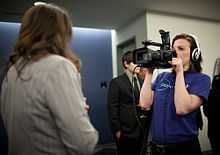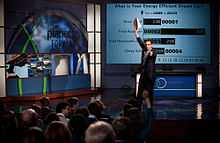Planet Forward
| Planet Forward | |
|---|---|
 Planet Forward logo smart people + smart ideas, online & on TV | |
| Genre | social network, TV show |
| Created by | Frank Sesno |
| Presented by | Frank Sesno |
| Country of origin | United States |
| Original language(s) | English |
| No. of seasons | 5 |
| No. of episodes | 3 |
| Production | |
| Executive producer(s) | Fuzz Hogan |
| Producer(s) | Maryland Public Television, The George Washington University |
| Running time | 56:46 |
| Broadcast | |
| Original channel | PBS |
| Original run | April 15, 2009 – April 8, 2011 |
| External links | |
| Website | |
Planet Forward, a project of the Center for Innovative Media at The George Washington University's School of Media and Public Affairs, is a online public forum where experts and engaged citizens weigh in on energy, climate and sustainability. Then, it takes the best ideas and features them online and on TV.[1]
Background
About
Planet Forward is inspired by the combined power of user-generated media and the tools of journalism to discover innovations that can change the world. This initiative challenges the conventional top-down format of traditional media and rewards contributors who are working to solve these problems by exposing them to the public and igniting both a conversation and a competition to help find the best ideas to move the Planet Forward.
Planet Forward has created a dynamic public square, curating the best ideas and innovations from scientists, business leaders, advocates, students and government leaders. Being based at the Center for Innovative Media at The George Washington University, Planet Forward can engage with students and faculty from the university as well as others across the country and the world. Planet Forward collaborates with a diverse group of organizations in order to find the best ideas and to bring them to the world.
How it Works
On the Planet Forward website, members can submit videos or written descriptions of their innovative solutions tackling today's toughest energy challenges

History
Created and hosted by Frank Sesno, Planet Forward launched its website in March 2009 and first aired on PBS on April 15, 2009.[3]
In December 2009, Planet Forward began producing weekly, online webisodes showcasing some of the best innovative solutions from Planet Forward members across the country. Each webisode is centered around a specific energy or environment-related topic, ranging from hybrid vehicles to smart grids.[4]
In October 2010, Planet Forward began producing monthly segments for PBS' Nightly Business Report. Like the webisodes, the Nightly Business Report segments focused on a particular green topic and featured ideas submitted by Planet Forward site members.[5] Planet Forward aired its second PBS special,The Energy of Innovation,[6] on April 8, 2011.[7]
Social Media
Planet Forward has a robust social media campaign, with active Twitter, Facebook and Pintrest accounts which it updates daily. As of February 2012, Planet Forward had over 8300 Twitter followers and 1600 Facebook fans.
Seasons
Season 1: Energy Future

Season 2: Carbon Footprint
Since the pilot phase of the project, Planet Forward relaunched its website, began producing a series of weekly webisodes and began producing monthly special segments for the PBS business series Nightly Business Report.[8] Planet Forward also archived the content from their first season. In the spring 2010 they addressed the question, "How Can We Reduce Our Carbon Footprint?" The ideas generated in response to the question were featured on a web-only special taped on April 16, 2010, featuring EPA Director Lisa P. Jackson.
Season 3: Energy Innovations

Planet Forward also entered into a partnership with National Geographic's Great Energy Challenge to produce and manage a blog hosted on the National Geographic website.[11]
Season 4: Changing Planet
In 2011, Planet Forward teamed up with The National Science Foundation, Discover Magazine and NBC News to produce “Changing Planet,” a series of town hall meetings on climate change across the country. Planet Forward members could submit their energy innovation ideas online to business leaders, politicians, journalists and experts in the climate and energy industry at a live town hall meeting at The George Washington University’s Jack Morton Auditorium for a chance to be featured on The Weather Channel.
Season 5: Smart Communities
In the fall of 2011, Planet Forward asked its members to share their ideas about creating smart, green-minded communities by posing the question: “What innovation can help communities build for the future and adapt to a changing planet?”[12] The best ideas have been featured in webisodes and Nightly Business Report segments.
In March 2012, Planet Forward began producing segments for Bloomberg Television’s “Bloomberg West” TV show.[13]
On April 17, 2012, Planet Forward and The George Washington University's Office of Sustainably hosted a "Turning Innovation into Action" symposium. Thought-leaders from government, industry, and academics joined to highlight solutions to the challenges of a changing planet. The half-day conference highlighted “Innovation Challenges” offered by participants to demonstrate their commitment to moving the planet forward. Panelists included Former Chief Technology Officer of the United States, Aneesh Chopra, Mayor of the District of Colombia, Vincent C. Gray, and Vice President of GE Ecomagination, Mark Vachon.
Sources of funding
Major funding for Planet Forward is provided by: The Tawani Foundation, National Science Foundation, John S. and James L. Knight Foundation, The George Washington University, Noblis, Volkswagen and stopglobalwarming.org[14]
Featured research
Planet Forward featured projects that have developed new technology in the energy sector, such as using the Earth's geologic hear to produce energy in El Salvador , Innovations for absorbing carbon dioxide from urban areas , the works of John Obik and Matthew Mitchel Urquhart in Project Home 2011 scientific research which utilizes quantum energy for electrostatic maglev devices , research into using air as fuel , and research for using bacteria as a possible alternative source of energy Planet Forward airs news broadcasts of these research projects on public television as a program trhat is actively involved with the community.
Images
-

Frank Sesno interacts with the audience.
-

Host, Frank Sesno.
-

Frank Sesno talks to guests during the 2011 PBS special.
-

Behind the scenes at the 2011 PBS special.
-

The Planet Forward staff.
References
- ↑ http://planetforward.org/about/about-us/
- ↑ http://planetforward.org/about/how-it-works/
- ↑ Rice, Doyle (April 15, 2009). "PBS takes on global energy with Web-driven Planet Forward". USA Today. Retrieved 8 December 2009.
- ↑ http://planetforward.org/about/how-it-works
- ↑ http://planetforward.org/nbr/planet-forward-series-premier-on-pbs-thursday/
- ↑ http://planetforward.org/productions/the-energy-of-innovation-2/
- ↑ http://planetforward.org/about/how-it-works/pbs-special/
- ↑ http://www.pbs.org/nbr/site/features/special/environment_planet_forward/ February 18, 2011
- ↑ http://planetforward.org/about/how-it-works/pbs-special/
- ↑ http://planetforward.org/community/innovator-of-the-year/
- ↑ http://www.greatenergychallengeblog.com/ February 18, 2011
- ↑ http://planetforward.org/season/smart-communities/
- ↑ http://planetforward.org/explore/channel/nbr/
- ↑ http://www.planetforward.org, February 17, 2012